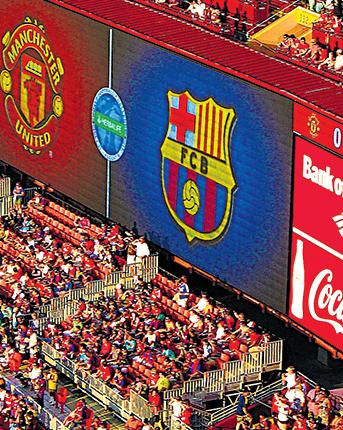
1 minute read
Deflating inflation figures
INFLATION in the UK fell less than was hoped, hampered by food and drink prices rocketing by 19.1 per cent.
The annual rate measured by the consumer price index (CPI) dipped to 10.1 per cent in March, the Office for National Statistics (ONS) said, continu‐ing its downward path after Febru‐ary’s 10.4 per cent.
Economists had expected a fall to 9.8 per cent but instead inflation re‐mained in double figures as food and drink prices rose at the fastest annual rate since 1977.
Britain was the only country in western Europe with double‐digit in‐flation in March, compared with an average of 6.9 per cent in the euro zone and 5 per cent in the United
FC BARCELONA is putting the finishing touches to plans for financing its Espai Barça project with a €1.5 bil‐lion bond issue.

Amongst other plans, this will finance a complete re‐modelling of the club’s Camp Nou football ground.
As investors will expect an interest rate of around 6 per cent costing the club an an‐nual €90 million, the market is waiting to see how and where it will seek the fund‐ing to meet these extra pay‐ments.
Little has gone smoothly for the club since announc‐ing its plans to finance the Espai Barça project.
Flat batteries
MTE Power, a small produc‐er of lithium ion batteries, initially intended to build its first factory capable of large ‐ scale production in Dundee.
The company recently told Sky News that it was considering whether to switch from the UK to the US where it would benefit from American subsidies under the Inflation Reduc‐tion Act.
“Unless we can make the UK a competitive place for battery manufacturers, we probably won’t end up with a battery manufacturing in‐dustry in the UK,” AMTE Power’s chief executive Alan Hollis said.
States.
It looks as though the Bank of Eng‐land will again raise the interest rate with financial markets now betting on a 97 per chance that the Bank will in‐crease the base rate by a quarter of one percentage point to 4.5 per cent on May 11. There were indications, insiders said, that this could hit 5 per cent by the autumn.
Referring to the March figures, Grant Fitzner, the chief economist at the ONS, said the principal drivers of the reduction were motor fuel prices and heating oil costs.
“Both fell after sharp rises at the same time last year. Clothing, furni‐ture and household goods prices in‐creased, but more slowly than a year ago. However, these were partially offset by the cost of food, which is still climbing steeply, with bread and cere‐al prices at a record high.”









